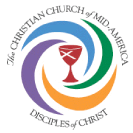When I arrived at First Christian almost three years ago to begin work as the lead pastor, I was excited to learn that we were sharing the building with another congregation, one whose cultural experiences, language, and approach to worship is quite different from my own. This congregation, the Chuukese Church, is made up of individuals from the Micronesian island of Chuk (located between Australia and the Hawaiian Islands). Some of the Chuukese people settled in St. Joseph for work and soon friends and family followed. Though most of the Chuukese population is Catholic, a small group of protestants were seeking out a church building where they might meet to hold worship and Bible study. One day their pastor, Is Phillik, happened to drive by First Christian and spotted our custodian out mowing the lawn. He approached him about possibly using the building and our relationship was born.
Initially our two groups simply shared the church, often only encountering each other by accident, as First Christian worshipped in the sanctuary early in the morning on Sundays, and The Chuukese Church worshipped later in the afternoon in the fellowship hall. Some of my congregation, in fact, were only vaguely aware that there was another group occupying the building.
But this all changed as Is, the Chuukese pastor, invited me to begin meeting regularly with him, pastor to pastor, for conversation -- talking about our ministries, our people, our goals, and our struggles as ministers of the gospel. The more we talked, the more we realized that others in our congregations could benefit from this kind of sharing. Our first real step toward a cooperative relationship began three years ago as we gathered for a joint Vacation Bible School. The children of our two groups took the lead toward true fellowship as they gathered for singing, laughing, praying, and learning together.
Several months later, our two groups joined again, this time for Sunday worship in observance of World Communion Sunday. On that day the entire worship experience was presented in both Chuukese and English. I preached on that Sunday, while Is translated. This was the day that I learned, sometimes to everyone's laughter, that you cannot always easily translate from English to Chuukese. My mention of "Oreos and milk" as a summer camp substitute for bread and wine at the communion table provided a challenge for Is in the translation and brought some confused stares from the Chuukese. But the most important message was heard loud and clear -- we are not one body in Christ in spite of our differences, but in celebration of the variety of gifts that we each share in the Kingdom of God.
Our two families of faith continued to occasionally worship together, and in time we developed office space for Is and his leaders, even as their congregation continued to grow and need more space in the building for study and worship. And each time I shared with my congregation that our Chuukese friends were expanding their hours and their use of the church building, the reaction was always one of gratitude. For what is the point of having a large building if it is not being used as much as possible for ministry?
The next big step in our partnership together was for an event we celebrate several times a year called Worship Without Walls. On this day, we gather on Sunday morning for a short time of worship in the sanctuary, and then we split up into smaller groups and go out to serve the community in mission. Each of those groups were made up of persons from both First Christian and The Chuukese Church, as together we served by feeding the hungry, painting at a women's shelter, cleaning up the neighborhood, and singing at a nursing home. After a few hours, we all gathered back at the church, some of us a little dirtier and a little tired, and we shared in a meal together, closing out our Worship Without Walls time with communion, fellowship, singing and prayer.
The partnership between our two churches continues to grow. Our Chuukese friends have helped with many maintenance projects around the building and taught us to consider new expressions of worship. We have had the privilege to be of help when members of the Chuukese Church have been in need of furniture, baby supplies, or other household items. My congregation has moved beyond thinking of the Chuukese Church as a group using "our" building. Rather, we understand that we are one body of Christ, wonderfully diverse, sharing a space that was gifted to us by others and which we hopefully will gift to future congregations.
As we look ahead to what I hope will be a future of continued shared ministry between First Christian and The Chuukese Church, I'm reminded of Jesus' parable of the mustard seed. Jesus taught: “The kingdom of God is like a mustard seed, which a man took and planted in his field. Though it is the smallest of all seeds, yet when it grows, it is the largest of garden plants and becomes a bush, so that the birds come and perch in its branches.” Jesus could have chosen to speak of the kingdom of God as if it were a mighty tree, like an oak or breadfruit or coconut tree. But instead he describes it as a bush that grows from the tiniest seed. Perhaps a reminder that from small beginnings can come great things, if the seed is planted in the rich soil of God's amazing and diverse creation.
Rev. Brian Kirk, Lead Pastor
First Christian Church, St. Joseph
